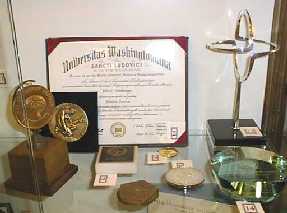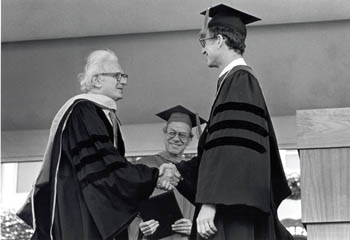Medals & Honors


Alumni Federation of Washington University Faculty Award, February 24, 1962.
Entry in Founder's Day Banquet program, February 24, 1962: "Professor Hamburger has been with the University since 1935. His field of research is experimental neuro-embryology. He teaches this subject and others closely related to it including special areas of anatomy and genetics. Professor Hamburger is a quiet and effective teacher whose great ability has left its mark on hundreds of students."
Honorary doctorate, Washington University, May 21, 1976.
From May, 1976 Commencement program: "Viktor Hamburger is Edward Mallinckrodt Distinguished University Professor Emeritus of Biology at Washington University. Born in a small town in Silesia, Germany, he attended the Universities of Breslau, Heidelberg, Munich and Freiburg. At the University of Freiburg, he studied with the renowned biologist, Hans Spemann, Nobel Laureate. Professor Hamburger earned his doctoral degree in zoology (experimental embryology) at the University of Freiburg in 1925. The recipient of a Rockefeller Fellowship in 1932, Professor Hamburger came to the United States to study at the University of Chicago with Dr. Frank R. Lillie. Three years later he joined the faculty of Washingotn University where he has remained ever since. During his tenure at this university, he served as Chairman of the Department of Zoology from 1941-1966. He has been a Visiting Professor at the University of Chicago, the Massachusetts Institute of Technology and the University of California at Berkeley. Professor Hamburger is a member of the National Academy of Sciences, one of the highest honors accorded a scientist in this country, as well as the American Academy of Arts and Sciences, Sigma Xi and Phi Beta Kappa."
4th F. O. Schmitt Lecture, Neurosciences Research Program, Massachusetts Institute of Technology, October 20, 1976.
This award, which was established in 1973 to mark the 70th birthday of Francis O. Schmitt, founder of the Neurosciences Research Program. The lecture, "Developmental history of the motor neuron," is reprinted in Neuroembryology: the selected papers., pp. 69-109. It was originally published in Neurosciences Research Program Bulletin, v. 15 (Suppl) 1977.
The award was made with the following citation: "Most widely recognized for his definitive studies of the development of the chick spinal cord and of the spinal and trigeminal ganglia, he has also made basic contributions to developmental genetics, to experimental teratology, to the initial discovery of the nerve growth factor, and, in recent years, to the ontogeny of behavior. His career has spanned the entire era of modern experimental embryology, beginning with his graduate student days in Spemann's laboratory when the "organizer" was discovered. Throughout the intervening half-century, his pioneering achievements have increased our knowledge and understanding of the development of the vertebrate nervous system and mark him as a distinguished leader in developmental neurobiology."
Wakeman Award for Research in the Neurosciences. 1978
This award was established in 1972 by Nancy Gardiner of Palm Beach, Fla., in honor of her late husband, William T. Wakeman. It is presented biennially at Duke University to winners chosen by a panel of neuroscience experts; it is considered one of the preeminent awards in the neurosciences.
Ross G. Harrison-International Society of Developmental Biologists (ISDB) Prize in Developmental Biology is awarded in the year 1981 to Victor [sic] Hamburger in recognition of outstanding record of pioneering achievements in Developmental Neurobiology. The Thirty-first of August, 1981, at the Ninth Congress of the International Society of Developmental Biologists, Basle, Switzerland.
Louisa Gross Horwitz Prize in Cell Biology and Developmental Neurobiology, October, 17, 1983.
Text of introduction by John G. Hildebrand. This prize is given by a committee of Columbia University medical and science professors; it is one of the awards that observers cite as a forerunner to the winning of the Nobel Prize. Many of the award's winners have gone on to become Nobel laureates.
Honorary doctorate, University of Uppsala, Sweden, 1984.
Ralph W. Gerard Prize for Distinguished Contributions to Neuroscience. 1985
The Society for Neuroscience endows this prize; it is named after Ralph W. Gerard, who was instrumental in founding the Society and served as Honorary President from 1970 until his death in 1974.
First FIDIA-Georgetown Award in Neuroscience. ["To Viktor A. Hamburger, May 2, 1987, Washington, D.C., National Academy of Sciences Auditorium."]
Award jointly sponsored by Fidia Research Foundation and Georgetown University. The lecture, "Some Recollections of a Neuroembryologist", and a biographical sketch are published in v.2, 1986-1987 volume of Fidia Research Foundation Neuroscience Award Lectures, pp. 146-158. The award citation: "Viktor Hamburger is a true pioneer in the field of neuroscience and is credited with establishing the fundamental discipline of neuroembryology. Over a career that spans more than 60 years and still continues today, he has made important contributions to developmental genetics, embryology, neuroembryology, nerve regeneration, developmental psychobiology and the history of science. Specifically, this award recognizes his discovery of the role of cell death in shaping the Central Nervous System and his leadership in fostering the innovative research leading to the discovery of the nerve growth factor."
Stephen W. Kuffler lecture (Dept. of Neurobiology, Harvard Medical School), May 8, 1989: "The rise of experimental neuroembryology: a personal retrospective."
The lecture is printed in Neuroembryology: the selected papers., pp. 389-406.
National Medal of Science ["Awarded by the President of the United States of America to Viktor Hamburger 1989."] Awarded by President George Bush Oct. 18, 1989.
"For his steadfast work that led to the discovery and understanding of normally occuring neuronal death, nerve growth factor, and competitive relationships in the vertebrate nervous system."
"THE SEARCH" William Greenleaf Eliot Society Award for Outstanding Service to Washington University. 1989.
The award includes a replica of "The Search," a sculpture designed by Heikki Seppä, professor emeritus in the School of Art. The sculpture symbolizes the University's endless quest for truth and knowledge. It is part of the collection of the University's Gallery of Art.
Honorary doctorate, Rockefeller University, 1996.
News release: Rockefeller University Honors Brooke Astor, Presents Honorary Degrees to Sydney Brenner and Viktor Hamburger and Awards 25 Doctorates at Graduation Ceremonies
Lifetime Achievement Award, Society for Developmental Biology, June, 2000.
"With a respectful nod to the history of developmental biology, the SDB awarded its first lifetime achievement award to Viktor Hamburger. Hamburger is known for his many contributions to developmental biology, including studies of neural development in the chick and his role in the discovery of nerve growth factor. Chris Wylie of the University of Minnesota, the society's outgoing president, showed a hand-written letter from the almost 100-year-old scientist, expressing his regrets that he was not able to attend the meeting. When Drew Noden of Cornell University accepted the award for Hamburger, it became apparent that Hamburger had given much to the scientists he trained. During his career, said Noden, Hamburger always considered both the philosophy of the science and the scientist as well as the history behind the research. Noden stressed that these traits are just as important for today's scientists. It's important to consider the history and context of developmental biology, even among, as he put it, "the crescendo of technology and the rush to generate experiments and meet the credentials of the top journals." Good science does not come from methodology alone." From Meeting Brief: From Arabidopsis to Zebra Fish New Techniques for Developmental Biology, by Amy Fluet.
Fellow of the Academy of Sciences of Saint Louis, appointment year unknown.